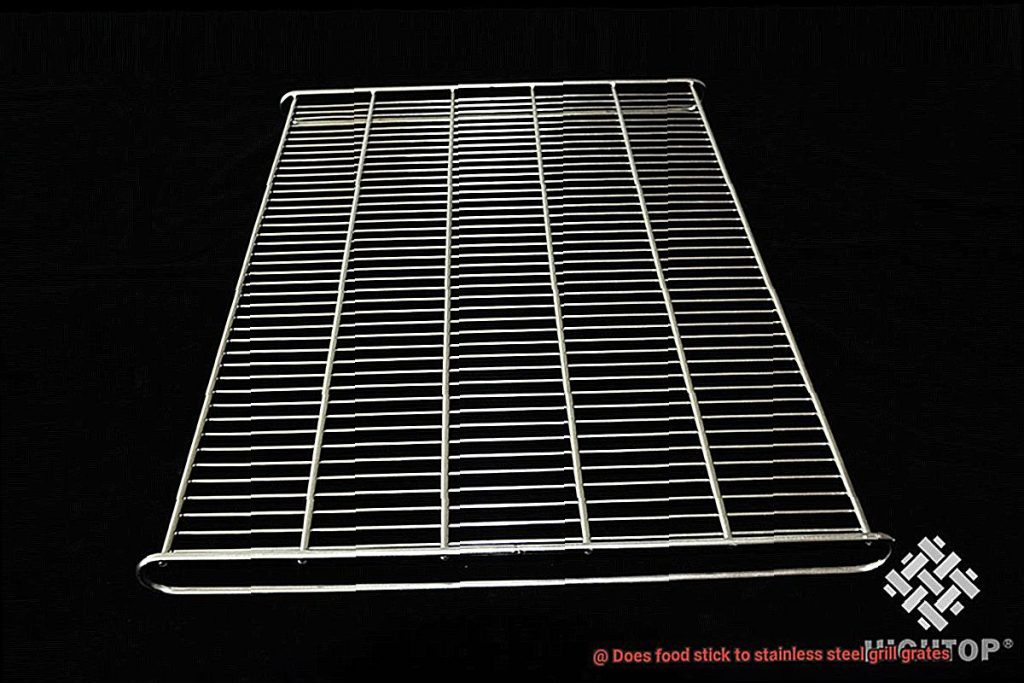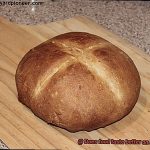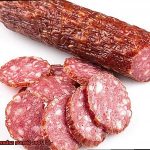Are you a grill master, the one who can cook up a storm and leave everyone’s taste buds tingling with delight? If yes, then you know how crucial it is to have the right equipment, including stainless steel grill grates. But what happens when your food sticks to them, making it difficult to clean and ruining your meal? That’s when you start wondering – does food stick to stainless steel grill grates?
Well, the answer isn’t as straightforward as a simple yes or no. Stainless steel grill grates are a popular choice for enthusiasts due to their ability to retain heat and durability. However, depending on what you’re cooking and the condition of your grill grates, you may experience some sticking.
In this blog post, we’ll explore all the factors that contribute to food sticking on stainless steel grill grates. We’ll discuss things like temperature control, food thickness, seasoning of the grates – everything that can make or break your perfectly grilled dish.
But don’t worry; we’ve got your back. We’ll also provide tips and tricks that will help prevent food from sticking and enhance the flavor of your dishes. By the end of this post, you’ll be armed with all the knowledge and skills needed to become an ultimate grill master. You’ll be able to cook juicy meats and veggies every time without worrying about food sticking on your stainless steel grill grates.
So, let’s get started.
Contents
What Causes Food To Stick To Stainless Steel Grill Grates?
Grilling on stainless steel grill grates is a fantastic way to cook delicious meals, but it can be frustrating when your food sticks to the metal surface. In this article, we will explore the reasons behind this issue and provide you with easy solutions to prevent it from happening.
One of the primary culprits of food sticking to stainless steel grill grates is improper preheating. When the grill’s temperature is too low, proteins in the food react with the metal and form a bond that’s hard to break. To avoid this problem, preheat your grill to a high temperature before placing any food on the grates.
Another factor that causes sticking is dirty and unseasoned grill grates. Over time, build-up of grease and debris creates a sticky surface that can make food stick. To avoid this, clean your grill grates regularly and season them with oil before each use.
The type of food being grilled also plays a significant role in its tendency to stick to the grates. Sugary and fatty foods tend to stick more quickly than leaner items due to their caramelization on the surface of the grill that creates a sticky residue. Choosing leaner foods can help prevent this issue.
Lastly, using non-stick cooking oil or spray can create a barrier between your food and the metal surface, making it easier to remove once it’s cooked. This helps ensure that your food cooks evenly and tastes delicious.
Types of Foods That Are Likely to Stick
Grilling is a quintessential summer activity that brings people together over delicious food. However, when it comes to cooking on stainless steel grill grates, some foods are more likely to stick than others. Understanding which foods are prone to sticking can help you prepare and cook your meals more effectively and avoid frustrating situations. Let’s take a closer look at five types of foods that are likely to stick.
Lean Meats
Chicken breasts, pork chops, and fish fillets are all lean meats that can stick easily to grill grates due to their low fat content. To prevent sticking, it’s essential to preheat your grill and oil the grates well before cooking. Another tip is to use a meat thermometer to ensure your meat is cooked through without burning.
Sugar-Based Marinades
Marinating your meat can add flavor and tenderize it, but be cautious of sugar-based marinades. Sugar can caramelize and create a sticky surface on the grill grates, causing your food to stick. Consider using a marinade that’s lower in sugar or oiling the grates before cooking.
Seafood
Fish and other seafood are notorious for sticking to grill grates. This is because seafood is often delicate and can fall apart easily on the grill. To prevent sticking, make sure the grill grates are well-oiled before starting cooking. You can also try using foil packets or a grill basket to keep your seafood from sticking.
Vegetables
Grilled vegetables are a healthy addition to any meal, but they can quickly become charred and stick to the grill if not cooked correctly. To avoid this, brush your vegetables with oil before placing them on the grill or use a vegetable basket or skewers.
Fatty Meats
Hamburgers, sausages, and other fatty meats tend to stick more often than leaner cuts of meat due to their higher fat content. Oiling the grates well before cooking and preheating the grill can help prevent sticking. Additionally, using a grill basket or flipping your meat frequently can also help.
How to Maintain Your Grill Grates
Maintaining your grill grates is crucial to ensure that they last for a long time and perform optimally. It is particularly important to keep your stainless steel grill grates in good condition to prevent food from sticking to them. Here are some expanded tips on how to maintain your stainless steel grill grates and prevent food from sticking.
Clean Your Grill Grates After Every Use
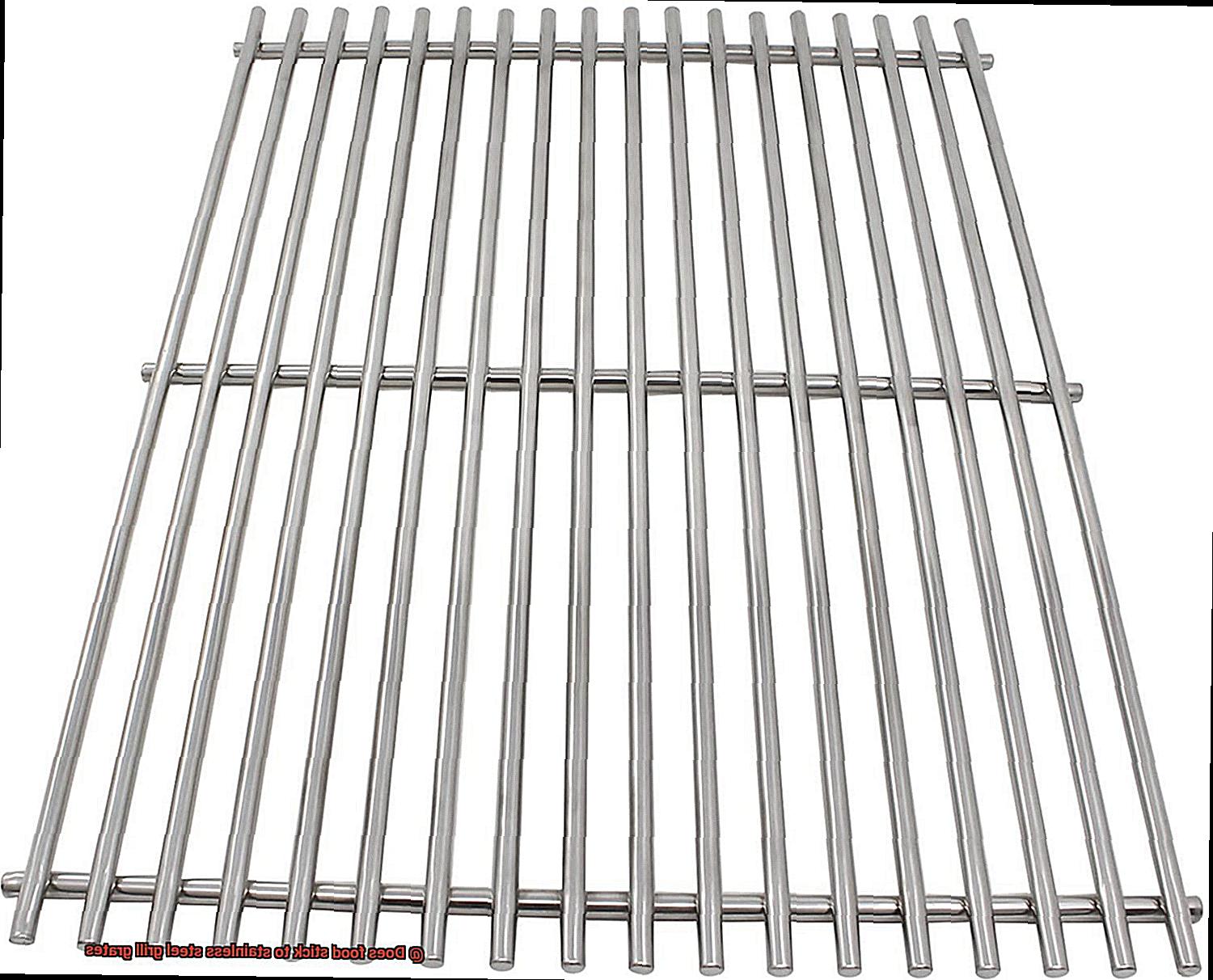
Cleaning your grill grates after each use is essential to prevent build-up of residue that can cause food to stick. Use a wire brush or scraper to remove any leftover food particles or burnt bits from the grates. Make sure to clean both sides of the grates thoroughly and the spaces between them. A clean grill grate also ensures that your food cooks evenly and keeps the flavor of previous meals from mixing.
Oil Your Grill Grates Before Cooking
Oiling your grill grates before cooking creates a non-stick surface that prevents food from sticking. You can use a high smoke point oil such as canola or grapeseed oil, and apply it using a paper towel or brush. However, make sure not to over-oil the grates as excess oil can cause flare-ups and affect the flavor of your food.
Season Your Grill Grates
Seasoning your stainless steel grill grates is another important step in maintaining them. It involves heating up the grates and rubbing them with oil to create a non-stick surface. Repeat this process several times before using your grill for the first time, and periodically thereafter. This helps build up a layer of seasoning on the grates that prevents food from sticking and protects against rust and corrosion.
Preheat Your Grill Grates Before Cooking
Preheating your grill grates before cooking helps to prevent food from sticking and ensures that your food cooks properly. Heat the grill on high for at least 10-15 minutes before placing your food on the grates. This also helps to kill any bacteria on the grates, making them safer to use.
Use Silicone or Wooden Utensils
Using metal utensils on your stainless steel grill grates can scratch the surface and cause food to stick. Instead, use silicone or wooden utensils. They don’t scratch the surface of the grates and are easy to clean.
Store Your Grill Grates Properly
Proper storage of your grill grates when not in use is essential to keep them in good condition. Keep them in a dry place and cover them with a grill cover or tarp to protect them from moisture and dust. You can also apply a light coat of oil to the grates before storing them to prevent rust and corrosion.
Preheating the Grill Grates
It not only prevents food from sticking but also ensures even cooking.
Before placing any food on the grill, let it preheat for at least 10-15 minutes. This allows the grates to heat up evenly and prevents hot spots that can cause food to stick. While the grill heats up, you can take the opportunity to clean the grates using a wire brush to remove any leftover food particles or debris from previous grilling sessions. This simple step will help prevent food from sticking and ensure that your meals cook evenly.
But how do you know if your grill grates are hot enough? You can use the “hand test.” Hold your hand about six inches above the grates and count how many seconds you can hold it there before it becomes too hot. If you can only hold it for two seconds, then the grates are hot enough for high-heat cooking like searing steaks. If you can hold it for five seconds, then the grates are at a medium-high heat, suitable for cooking chicken or vegetables.
Preheating your grill grates is crucial in ensuring that your food doesn’t stick and is cooked to perfection. But there is more to taking care of your grill grates than just preheating them. Here are some other tips to keep your grates in top condition:
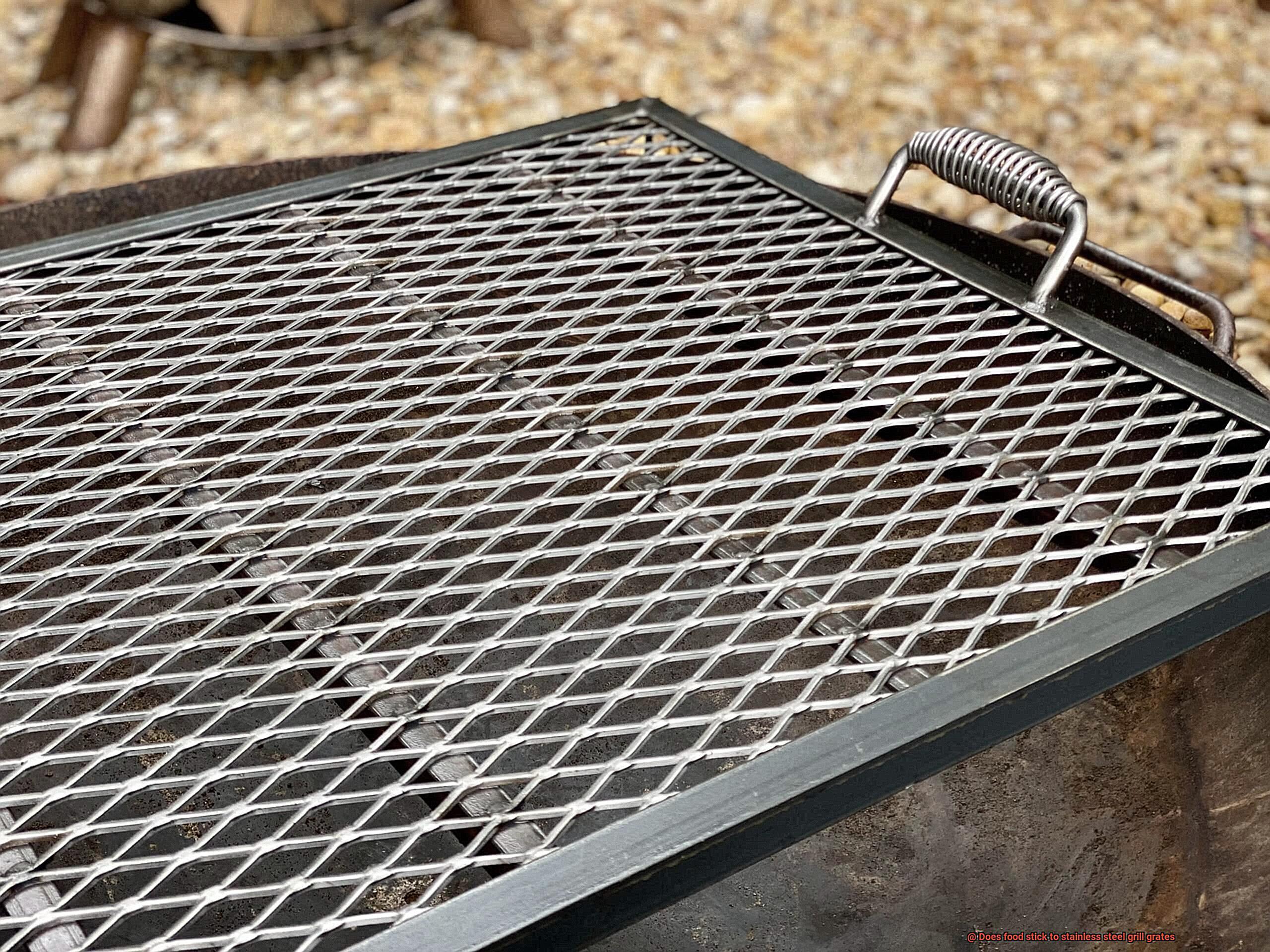
- Clean them after every use
- Oil them before cooking
- Season them periodically
- Use silicone or wooden utensils instead of metal ones
- Store them in a dry place with a light coat of oil to avoid rust and corrosion.
Brushing the Grates with Oil Before Cooking
There is a simple solution that can transform your grilling game. It’s called brushing the grates with oil before cooking.
To understand why this technique is so effective, let’s break it down. When you brush the grates with oil, it creates a barrier between your food and the metal. This barrier prevents sticking and promotes even cooking. Plus, the oil can enhance the flavor and moisture of your food, taking it to the next level of deliciousness.
Now for the methods. You can either use a high smoke point oil like canola or vegetable oil and a heat-safe brush or paper towel, or opt for a non-stick cooking spray that can be applied directly to the grates. Whichever method you choose, remember to do it before preheating the grill to prevent flare-ups and ensure that the oil doesn’t burn off too quickly.
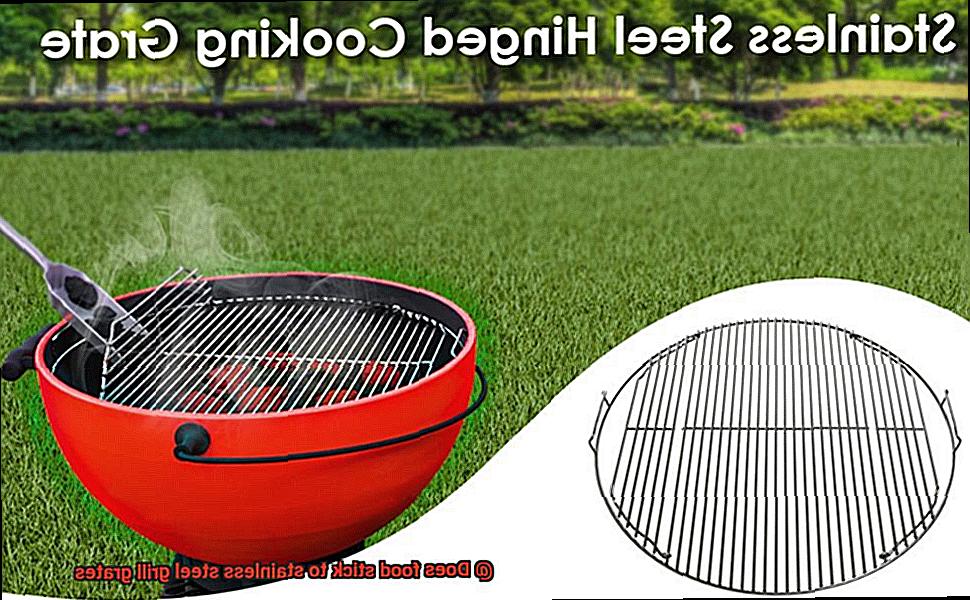
When applying the oil, use enough to fully coat the grates without causing any drips onto the flames. A nice even layer will do wonders for your food.
In summary, brushing the grates with oil is an easy yet effective way to prevent sticking, promote even cooking, and enhance flavor and moisture. So next time you fire up your grill, don’t forget this crucial step. Your taste buds (and your guests) will thank you.
But wait, there’s more. Here are some additional tips for brushing the grates with oil:
- Use a high-quality oil for best results.
- Clean the grates before brushing to remove any debris or buildup.
- Use a long-handled brush or tongs to avoid getting burned.
- Experiment with different oils and spices to customize your flavor profile.
Using a Grill Basket or Foil Packets for Delicate Foods
As an expert in this field, I’ve done my research and discovered the advantages and disadvantages of each method.
First up, let’s talk about grill baskets. These perforated pans are perfect for cooking small or delicate items directly on the grill. They offer direct contact with the heat source, creating a delicious charred flavor that’s hard to resist. And, they’re eco-friendly and reusable, making them a great choice for those who care about the environment. However, flipping items in the basket can be tricky without them falling apart, and smaller items may still slip through the holes.
On the other hand, foil packets are an excellent option for steaming delicate foods while keeping them moist. Wrapping your food in aluminum foil and placing it on the grill is an easy way to keep things clean and prevent sticking. Plus, cleanup is a breeze since you can simply discard the foil after use. However, foil packets don’t offer direct contact with the heat source, so you won’t get that same charred flavor as you would with a grill basket or directly on the grates.
No matter which method you choose, there are a few things to keep in mind. Properly preparing your food before grilling is crucial to prevent sticking. Pat dry any excess moisture and lightly coat with oil or cooking spray. Also, avoid overcrowding the basket or packet to ensure even cooking and prevent items from getting stuck together.
p5XcN3AyITY” >
Also Read: Everything You need to Know About The Steelmade USA…
Conclusion
After considering all the factors, it’s clear that stainless steel grill grates are a top choice for grill enthusiasts. They’re tough, durable, and retain heat well, making them perfect for cooking up delicious meals. However, food sticking to the grates can be a real buzzkill.
But don’t worry – there are several things you can do to prevent this from happening. Firstly, make sure your grill is preheated properly before cooking. Secondly, keep your grates clean and well-seasoned by oiling them before cooking and cleaning them after every use. Thirdly, consider using silicone or wooden utensils instead of metal ones to avoid scratching the surface of the grates.
In addition to these tips, you can also use a grill basket or foil packets for more delicate foods like fish or vegetables. Brushing the grates with oil before cooking can also help promote even cooking while enhancing flavor and moisture.
By following these simple tricks and techniques, you’ll be able to cook up juicy meats and veggies without worrying about food sticking on your stainless steel grill grates.

